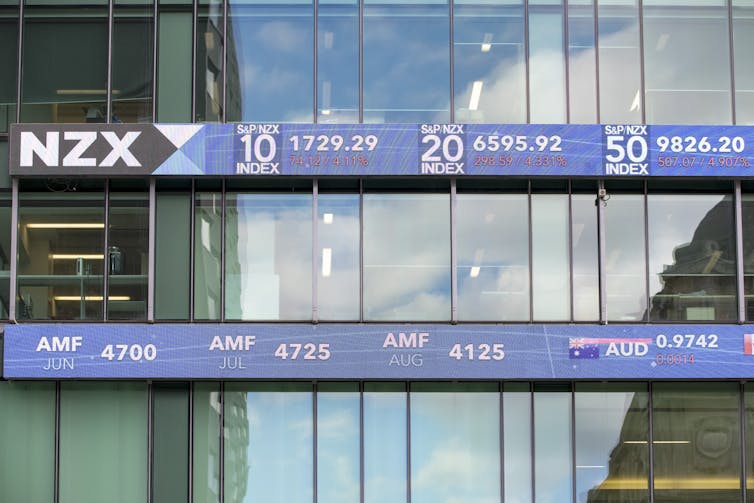Policy uncertainty and your investments
Ihsan Badshah, Prasad Hegde and Sara Ali
10 Oct 2022

This article is republished from The Conversation under a Creative Commons license, written by Ihsan Badshah, Prasad Hegde and Sara Ali from Auckland University of Technology along with Riza Demirer, Southern Illinois University Edwardsville. Read the original article.
The COVID-19 pandemic created a sense of uncertainty and fear across all aspects of life in New Zealand. Along with concerns about health and well-being, many wondered what impact the pandemic would have on the economy and economic policy.
Unpredictable events like this carry significant risk for investors and fund managers alike. There have been several major events in the past two decades that have sent shock waves across the global economy – for example, the 2000-2001 dotcom bubble, the 2007 global financial crisis, Brexit and, more recently, the Russian invasion of Ukraine.
Researchers from Auckland University of Technology have developed an index that highlights just how sensitive our investments are to domestic policy concerns.
This work builds on the limited number of tools to help businesses and investors manage these crises.
Creating a guide for investors
Our study developed a numerical measure, called an “economic policy uncertainty” (EPU) index.
An index is a measure that represents a market in a specific country – NZX50 or ANZ’s business confidence index, for example. These measure the rise and fall of stock prices (or business confidence).
Similar to the business confidence index or investor sentiment index, our EPU index measures the levels of uncertainty stemming from economic policies.
Working from more than two decades of data, our index maps how the stock market responds to periods of economic policy uncertainty. Higher values in the index indicate greater policy-related economic uncertainty faced by political decision makers, giving investors the chance to respond early and shift investment strategy.

Millions of data points
To create our index, we used an already well established methodology based on newspaper coverage of economic policy developments. We incorporated more than eight million newspaper articles published between 1997 and 2021 by four major news outlets including NZ Herald, Fairfax, Stuff and Interest.co.nz.
With the help of digital tools, we extracted words from each news article that broadly captured the three main dimensions of economic policy in New Zealand: news coverage of policy related to economic uncertainty, tax code provisions, and disagreement among economic forecasters.
By focusing on the managed funds industry – non-bank financial institutions that manage investors’ money – and examining monthly returns for a diverse set of mutual funds, pension funds, insurance funds and exchange traded funds, we found that economic policy uncertainty can influence trading behaviour.
In short, fund managers were willing to pay an economically significant premium for funds that offered a hedge against policy uncertainty.
NZ’s unique investment industry
The managed fund industry in New Zealand has several unique features that can broaden our understanding of the crossover between economic policy uncertainty and financial markets.
First, the industry doubled between 2014 and 2021, growing from around NZ$115 billion to $257 billion.
Second, almost 85% of stock investments in New Zealand are carried out by the managed investment funds, making it a useful industry to test the implications of our index.
A third distinguishing feature of the NZ investment industry is a relatively high investment in foreign stocks, bonds and other assets. Between roughly 60% and 70% funds in New Zealand are invested in foreign assets.
Yet, until now, little has been known about the factors driving fund returns during periods of economic policy uncertainty. Our study attempts to fill this void and highlights the need to account for local economic policy uncertainty in making investment decisions.
Bucking traditional wisdom
Given the unique features of NZ investment industry, conventional wisdom suggests that funds should be more sensitive to global uncertainty than domestic uncertainty.
However, our findings run counter to this. We show that domestic policy uncertainty indeed matters significantly more than those at a global level.
There are two possible explanations for this finding. First, the NZ index contains both local and global economic shocks and is therefore more complete. The second explanation is that NZ fund managers (investors) incorporate more local economic policy uncertainty shocks than global shocks in their investment decisions.

Local insights
Our analysis revealed four key findings:
- Funds that are more sensitive to economic policy uncertainty are considered risky, therefore risk-averse investors will require a higher return for investing in these risky funds. We estimate the required compensation to be 6% per year.
- Our index can predict future fund returns for up to 12 months based on risk factors affecting the different types of stocks.
- Since our index predicts future economic policy-related changes, investment managers can devise strategies to optimise their returns. At the same time, the index can be used by organisations such as the Reserve Bank of New Zealand to predict what changes to policy might mean for the market.
- Finally, global and local investors can use our index as a proxy for the investment outlook in New Zealand.
Fundamentally, our study offers new insights into the NZ fund industry and paves the way for future work to explore whether policy uncertainty can drive investor cash flows in or out of funds.
Another interesting application would be to examine if policy uncertainty contributes to possible herd behaviour among institutional investors and how such behaviour, if present, affects investor returns.
Useful links
- Read profiles of Ihsan Badshah, Prasad Hegde and Sara Ali
- Study business at AUT